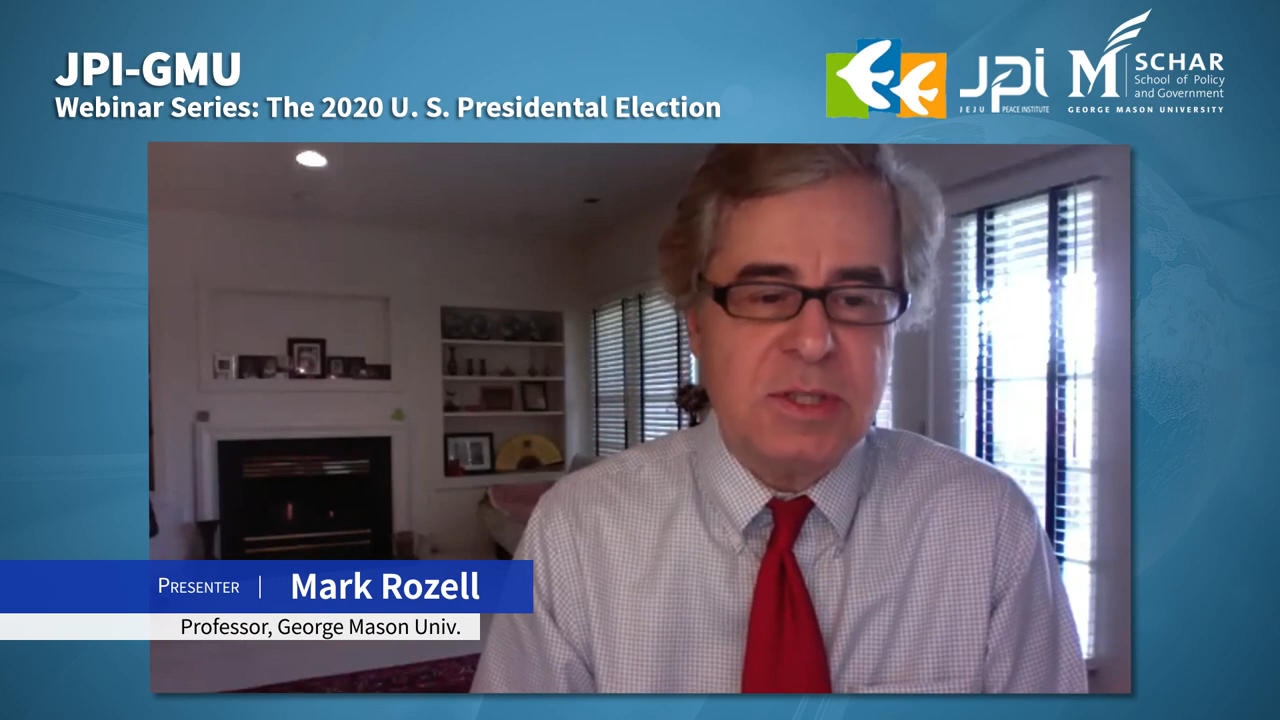Review of [JPI Online Conferences] 2020 US Presidential Election
Video Link: https://youtu.be/tWgfRGxFsvA?t=200
Professor Mark J. Rozell, Dean of the Schar School of Policy and Government at George Mason University, made a comprehensive yet insightful overview on the 2016 U.S. Presidential Election as well as likely projections for the 2020 Election coming up in November 2020 at the webinar series organized by the Jeju Peace Institute (JPI).
Professor Rozell analyzed how President Trump won the 2016 Presidential Election despite Hillary Clinton winning the popular vote. The Electoral College, a winner-take-all voting system in the United States, requires candidates to win 270 electoral votes out of 538 electors rather than to win the overall popular vote. In the 2016 election, Trump presented himself as “a different Republican” in order to break through the strongly democratic leaning states, known as the “blue wall”. He strategically targeted these states, particularly in the Midwest and upper Midwest region whose economic concerns had been frequently dismissed by Clinton. According to Professor Rozell, analysts agree that Clinton made a “huge strategic mistake” by being complacent towards these “reliably blue states” like Wisconsin, in which she had never visited during the campaign.
Furthermore, he presented on the variables and potential outcomes of the 2020 Presidential Election. Using poll data, he estimated 268 electoral votes for Joe Biden and 185 votes for Donald Trump. He predicted, “it will be a very difficult campaign for Donald Trump” since he lost a significant number of supports from the critical states, such as Michigan, Wisconsin, and Pennsylvania. Meanwhile, Joe Biden only needs to win one of the critical states—Arizona, Wisconsin, Ohio, North Carolina, and Florida. Or, he should either win a single elector in each of the two states that split their electoral college votes.
The loss in support from the White evangelist, who was the “core of his electoral base,” has led to a significant drop in Trump’s support. Also, the police murder of George Floyd, which has led to a “massive movement” in the United States has a big impact since he did not show “a message that resonated with the American people.”
Recently, the COVID-19 pandemic has emerged as a crucial variable towards the election in November. During the Trump Administration, the unemployment rate had been decreasing, but due to the pandemic, the country encountered an economic crisis with an unprecedented unemployment rate in approximately 80 years. The plummeting job rate is a major reason for the crisis of the administration. To get ahead in the game, the Trump Administration needs to find solutions to overcome the economic crisis and implement effective measures in combating COVID-19.
Due to the soaring number of COVID-related deaths in the U.S, citizens are inclined to harp on the necessity of public health considering the collapse in the medical system. However, Joe Biden’s public health care plan, which is a succession of Obamacare, requires an additional collection of tax compared to that of the Trump administration. Especially in this time of pandemic-induced unemployment, this may be an extra burden to economically vulnerable voters who may further face difficulties by voting for Biden. Also, Biden’s public health care that includes aid for undocumented immigrants in the U.S may provoke further repulsion among the voters in the manufacturing sector who feel threatened by the increasing immigrants – who vastly live in the contested swing states. Overall, the decrease in income caused by the additional tax is an immediate matter while the voters question the success of the public health care service.
It is also imperative to consider how the mail-in-ballot voting system will alter the presidential election outcomes. As some states are implementing universal mail-in ballot, a voting system that allows all voters to vote via mail as a response to prevent the spread of the virus. This will lead to a high volume of mailed ballots. Trump opposes mail-in votes, claiming that it is all too likely to exceed the work capacity of the Federal Post Office, causing votes that will inevitably arrive after the deadline to be counted invalid. In spite of the pandemic, the proportion of voters who want to visit polling stations is much higher among Trump’s supporters. Therefore, universal mail ballot is considered as a system that is advantageous to the Democratic party. In response, Trump had continually denounced mail voting, even going so far as to mention the possibility of extensive election fraud.
More than 4 million people voted early so far for the 2020 U.S presidential election, as it makes up 37 percent of the total vote counted for the 2016 U.S presidential election. With less than two weeks left before the election, how will these variables affect the voter’s choice? The 2020 U.S. Presidential Election is one for the world to keep a close eye on, for whoever takes the role of U.S. president next will inevitably face immediate and trivial challenges in regard to the pandemic, economy, immigration, trade, security, and many others.
Sua Oh is a sophomore majoring in Global Affairs at George Mason University Korea Campus. Her primary interest is human security as she aims to study ‘people-centered’ policies to reduce inequalities and insecurities around the world. Through this program, she strives to enhance her research skills in order to contribute towards solutions for various international security challenges..
Photo can he found here




